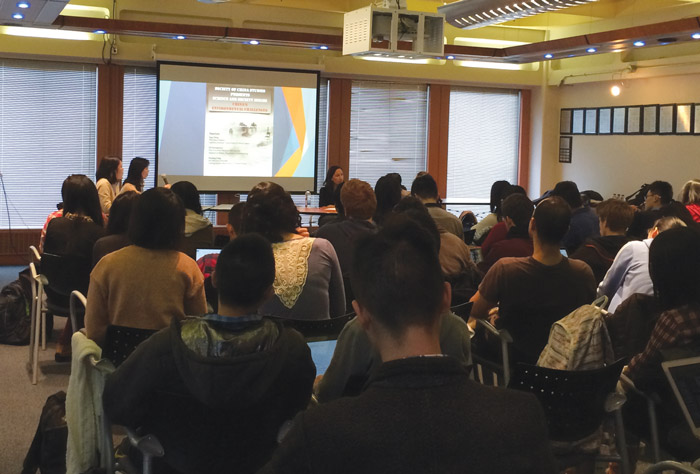Last Friday, the Society of China Studies hosted a panel discussion to explore the issue of China’s environmental challenges. The panel consisted of assistant professor Juan Wang from the Department of Political Science; assistant professor Jill Baumgartner from the Department of Epidemiology; and visiting scholar Wenting Liang from the Department of Political Science. The panel discussed the causes and impacts of environmental degradation, the present situation in China, as well as thoughts regarding possible future policy prescriptions and actions that could be taken by the Chinese government. Approximately 70 participants attended the event.
The first panel question asked Baumgartner about the impact that air pollution had on the health of people in China. Baumgartner spoke about a recurring study known as the Global Burden of Disease study, which examines risk factors for diseases and their possible impacts on health.
“China has been shifting from diseases related to nutrition or infectious diseases […] to cardiovascular disease, [Chronic Obstructive Pulmonary Disease, and] chronic obstructive lung diseases,” Baumgartner said. “Air pollution has been a large part of that shift.”
Baumgartner referred to cities such as London, which had once experienced heavy air pollution, as guidance for China in shaping future policy.
“Part of it is changing behaviours—trying to get people to drive less and look at mass transit,” she said. “Part of it is switching to improved fuels inside homes.”
In response to the question of how effective implementation of policies to reduce pollution would be, Wang explained that genuine political will to address the problem of pollution would rely on creating incentives for industries to change production methods.
“If the government wants something to have positive impact, it will really be inducing certain behaviours instead of setting a standard,” Wang said.
Liang also discussed the various aspects of the enforcement of environmental laws.
“The public only [blames] the Ministry of Environmental Protection [and] the environmental law,” she said. “I think it is unfair to say this. The law is the last solution to resolve the question.”
Wang disagreed, highlighting the importance the political structure of China plays in the ability and will to enforce laws.
“The law is […] one response to the environmental problem,” Wang said. “How well it will be enforced depends on the intention behind the lawmaking and who are the actors involved in the implementation process. [Often] the Environmental Protection Bureau [is] either listening to the local government and not doing much to stop the polluting industries or [it is lacking] so much funding that it will allow pollution so [as to] fine the industry and keep the money for itself.”
The event ended with a question and answer period. Jacky Zheng, a U2 Arts student, asked the panellists whether there is a tendency to create an independent environmental protection police system to ensure the law enforcement and security of the regulation.
In response, Wang explained that an environmental protection police system would have to be a coordination between various departments and organs of the government.
An organizer, Tianyu Zhang, said that the goal of the event was to create an interdisciplinary discussion.
“Traditionally the [Society of China Studies] has focused on [social science] issues just because of its member makeup,” Zhang said. “But we wanted to make the shift, and [the] environment seems like something that is the perfect thing to bring these two together.”










CORRECTION “Traditionally the [Society of China Studies]
has focused on [social science] issues just because of its member makeup,” Zhang
said. “But we wanted to make the shift, and [the] environment seems like
something that is the perfect thing to bring these two together.”